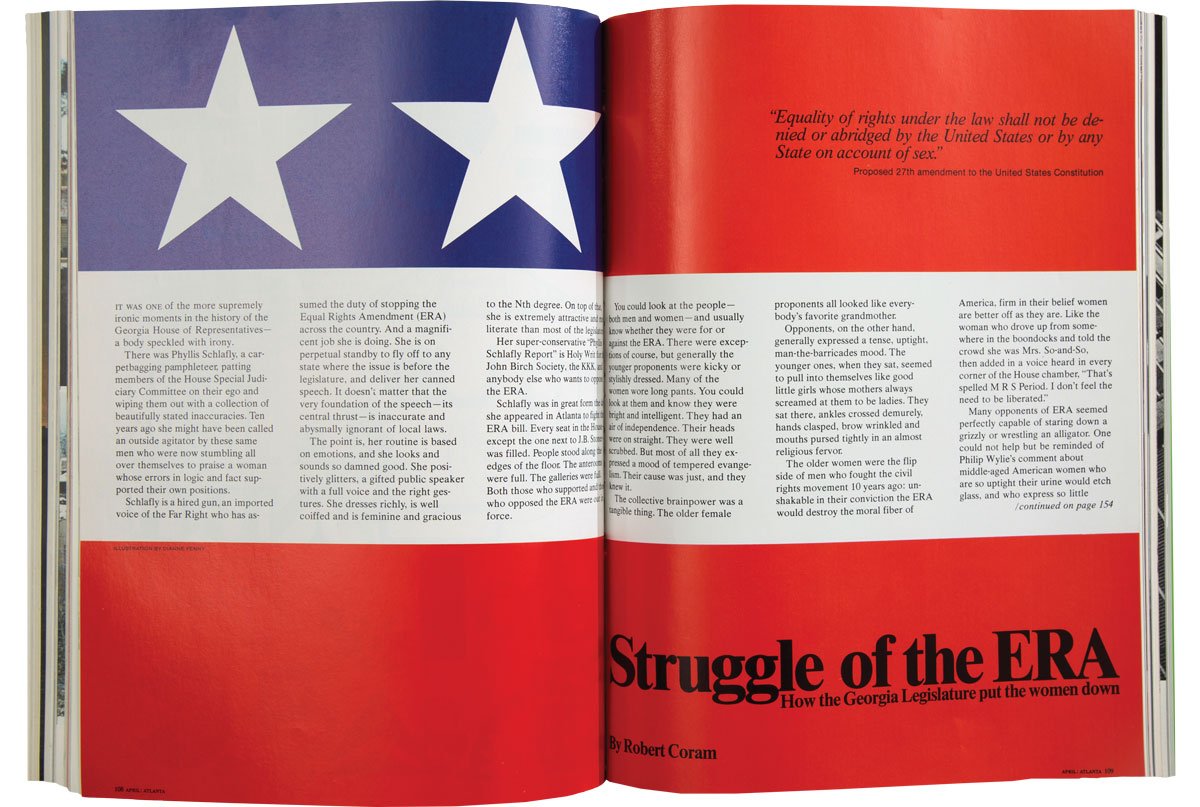 Editor’s note: This sometimes off-base article details the legislature’s run-in with the infamous Phyllis Schlafly and the fight to pass the Equal Rights Amendment in Georgia, something the state (and country) has yet to do. After this article published in April 1973, four magazine staffers, including Coram, filed sex discrimination suits against the magazine’s owner (the Chamber of Commerce) on the grounds that women doing the same jobs didn’t have comparable salaries. The suit was settled out of court, and the chamber standardized its pay scale and urged its members to do the same.
Editor’s note: This sometimes off-base article details the legislature’s run-in with the infamous Phyllis Schlafly and the fight to pass the Equal Rights Amendment in Georgia, something the state (and country) has yet to do. After this article published in April 1973, four magazine staffers, including Coram, filed sex discrimination suits against the magazine’s owner (the Chamber of Commerce) on the grounds that women doing the same jobs didn’t have comparable salaries. The suit was settled out of court, and the chamber standardized its pay scale and urged its members to do the same.
It was one of the more supremely ironic moments in the history of the Georgia House of Representatives—a body speckled with irony.
There was Phyllis Schlafly, a carpetbagging pamphleteer, patting members of the House Special Judiciary Committee on their ego and wiping them out with a collection of beautifully stated inaccuracies. Ten years ago she might have been called an outside agitator by these same men who were now stumbling all over themselves to praise a woman whose errors in logic and fact supported their own positions.
Schlafly is a hired gun, an imported voice of the Far Right who has assumed the duty of stopping the Equal Rights Amendment (ERA) across the country. And a magnificent job she is doing. She is on perpetual standby to fly off to any state where the issue is before the legislature and deliver her canned speech. It doesn’t matter that the very foundation of the speech—its central thrust— is inaccurate and abysmally ignorant of local laws.
The point is, her routine is based on emotions, and she looks and sounds so damned good. She positively glitters, a gifted public speaker with a full voice and the right gesture. She dresses richly, is well coiffed, and is feminine and gracious to the Nth degree. On top of that, she is extremely attractive and more literate than most of the legislators.
Her super-conservative Phyllis Schlafly Report is Holy Writ for the John Birch Society, the KKK, and anybody else who wants to oppose the ERA.
Schlafly was in great form the day she appeared in Atlanta to fight the ERA bill. Every seat in the House—except the one next to J.B. Stoner—was filled. People stood along the edges of the floor. The anterooms were full. The galleries were full. Both those who supported and those who opposed the ERA were out in force.
You could look at the people—both men and women—and usually know whether they were for or against the ERA. There were exceptions of course, but generally the younger proponents were kicky or stylishly dressed. Many of the women wore long pants. You could look at them and know they were bright and intelligent. They had an air of independence. Their heads were on straight. They were well scrubbed. But most of all they expressed a mood of tempered evangelism. Their cause was just, and they knew it.
The collective brainpower was a tangible thing. The older female proponents all looked like everybody’s favorite grandmother.
Opponents, on the other hand, generally expressed a tense, uptight, man-the-barricades mood. The younger ones, when they sat, seemed to pull into themselves like good little girls whose mothers always screamed at them to be ladies. They sat there, ankles crossed demurely, hands clasped, brow wrinkled, and mouths pursed tightly in an almost religious fervor.
The other women were the flip side of men who fought the civil rights movement 10 years ago: unshakable in their conviction the ERA would destroy the moral fiber of America, firm in their belief women are better off as they are. Like the woman who drove up from somewhere in the boondocks and told the crowd she was Mrs. So-and-So, then added in a voice heard in every corner of the House chamber, “That’s spelled M R S Period. I don’t feel the need to be liberated.”
Many opponents of ERA seemed perfectly capable of staring down a grizzly or wrestling an alligator. One could not help but be reminded of Philip Wylie’s comment about middle-aged American women who are so uptight their urine would etch glass, and who express so little appeal they couldn’t make a hermit move 10 paces off a rock ledge.
All the ERA opponents—male and female—were clad in the armor of a righteous cause. It was both a Holy War and a battle against those who would destroy the American mother. God and patriotism were on this side, and the speakers never let the crowd forget it. Many waved the Bible, literally holding one in the air and screaming like Old Testament prophets.
This group was too uptight even to take part in that good old American tradition of hissing and booing when a speaker was obviously trying to put out a smoke job. The proponents hung loose enough to go in for a little gentle, almost good-natured hissing at some of the more outlandish statements of the opposition. But the opposition felt it was above such low behavior and said so.
Most of the ERA supporters were from Atlanta. A few came from out in the boondocks. They represented many of the most distinguished groups in the state: the Governor’s Commission of the Status of Women, the National Organization for Women, the League of Women Voters, the American Association of University Women, the Women’s Political Caucus, the Georgia Women Lawyers, Common Cause—dozens of groups.
Opponents generally were representing themselves, though a few groups had spokesmen—the John Birch Society, the Ku Klux Klan. But Schlafly was the Big Gun of the opposition. She was the only out-of-stater who testified—a fact the committee found convenient to overlook.
Anyway, Schlafly is the star. She sits there very composed, very demure, accepting the homage paid her, not at all rattled at being pointed out as the celebrity of the day, the woman who wrote A Choice Not an Echo—a Goldwater paean full of alleged leftist conspiracy. She leads off the opposition rebuttal and is given all the time she wants. Her entire presentation is centered around what she calls the “wonderful rights of women.” Brought down to the nitty-gritty, the three main “wonderful rights of women” she discussed were dower rights, protective legislation for women, and the right of support wives have from husbands. It was Schlafly’s contention the ERA would wipe these out; that women would lose the privileges now afforded them.
Representative Andy Roach, chairman of the Special Judiciary Committee, which by its nature requires members be lawyers and have some acquaintance with the law, nodded his head in agreement as Schlafly talked about dower rights which allot a man’s real estate to his widow. What he apparently didn’t know and what Schlafly obviously did not know is that the Georgia Legislature abolished dower rights several years ago. And the Legislature abolished most protective legislation as being repressive towards women. Also, Title VII of the U.S. Civil Rights Act of 1964, which prohibits discrimination in employment on account of sex, has either eliminated most protective legislation or extended its protection to men.
As for the right of support, this is a false protection. The courts almost never issue a support decree as long as a man and wife are living together. A husband can give his wife $20 a week and his girlfriend $150 a week, and there is nothing the wife can do, right of support or not. And if you think such instances are not common, ask anybody at the Legal Aid Society.
The basic principle of the ERA is simply that sex is not a permissible factor in determining the legal rights of women and men. (Twenty-nine states have voted to ratify the ERA. 38 states must approve for it to become an amendment to the Constitution.)
Women like to say that men are also protected by the ERA but in essence, the proposed amendment (which was not ratified by the Georgia Legislature) would most benefit white women. Black men, Black women, and white men now have constitutional protection not afforded white women, a majority group treated like a minority.
The heart of the ERA involves property rights, marriage and divorce, right to engage in an occupation, and freedom from discrimination in employment and education. But the opposition in the Georgia Legislature effectively camouflaged these central issues by contending the ERA means women could use men’s bathrooms; that rape would no longer be a crime. J.B. Stoner, the KKK spokesman, told the packed House that ERA would “destroy motherhood and the home,” that it would “put women in racially mixed barracks with men,” and that it would “legalize prostitution.” The Reverend Bob Spencer, one of God’s spokesmen on the Far Right and one of a number of clerical types who spoke against the ERA, said, “The Equal Rights Amendment is a denial of God.”
Representative Bob Howard of the Special Judiciary Committee told a reporter privately the bill meant that “people, irrespective of their plumbing, will use the same bathrooms.”
While all of this is emotional nonsense, the Schlafly technique carried much credence. She contends the ERA will wipe out laws protecting women against rape, and she quotes an article from the Yale Law Review—considered the best thing ever written on the ERA—as her authority. Now, the Yale Law Review is a periodical of no small import in legal circles. When Schlafly quotes the YLR and even gives the page number, then that’s gospel, brother. And only perhaps one of 100 who hear her will ever read the article in its entirety. Were they to do so, they would note certain of her discrepancies.
For instance, she gives a page number and even a quote to substantiate her contention that rape laws would be invalidated by the ERA. Strong stuff. Except the quote is from a summary at the end of a section of the article and has nothing specifically to do with rape. If she had gone to the specific section of the article having to do with rape laws, she would have read that a law based on a unique physical characteristic of men—a law very narrow and specific in scope—probably would be upheld by the courts. ERA or not.
Schlafly also uses the YLR article to buttress her contention the ERA would make women subject to the draft and combat duty. But the ERA will no more require all women to be drafted than all men are drafted. With the coming abolition of the draft, this will become a moot point. And as for serving in combat, fewer than 1 percent of members of the military ever see combat. What opponents fail to mention is that women in the military are eligible, on an equal basis with men, for education benefit, medical services, and preferential veterans’ treatment which go along with military service.
The list of fallacies is endless. One more deserves a passing mention only because of the humor involved. The Schlafly Report says ratification of the ERA would have a profound effect on the weakened structure of American family life, and that destruction of the family is “one of the foremost goals in taking over a country” by communism. It also ties in the women’s liberation movement with ERA (the two are not synonymous) and says the “evil influence” behind women’s lib is revealed in its clenched fist, which is a symbol of the Communist. Contrast this alleged Communist affiliation with the fact the ERA has been or is supported by President Dwight Eisenhower, President Richard Nixon, Governor George Wallace, the Women’s Christian Temperance Union, the National Federation of Republican Women’s Clubs and Atlanta Journal Associate Editor John Crown—not exactly a hotbed of fellow travelers.
Schlafly’s errors in logic and fact went completely over the heads of Committee members. She just looked so good standing there. And she sounded like a million dollars. And when she said the Supreme Court would be issuing interpretations of the ERA if it were ratified, and that this was wrong because it preempted the duty of state legislatures which were much closer to the people, then that had the Committee members nodding their head in agreement. That woman flat knew what she was doing. Anybody who comes to Georgia to badmouth the Supreme Court and to tell local legislators they are close to the people is mashing the right emotional button.
Representative Roach was standing in the aisle by the side of the House chamber while Schlafly was speaking. This comment by her made him nudge a colleague in agreement and nod his head sagely.
Then, a reporter asked him why most legislators seemed to frown on the ERA. He said the legislation would “reduce the dignity of the ladies. It will take them out of the prestigious position they now hold.” He indicated the Committee was not favorably disposed toward the ERA, but, when pressed for specific reasons, he could only nod toward Schlafly and reply, “Because of what she is saying.” Yeah, but specifically what is she saying that you agree with? “Just everything she is saying.”
Roach’s forecast of defeat was accurate. The ERA never came out of committee. It was gone but far from forgotten. A coalition of more than a dozen of the most distinguished women’s groups in Georgia sent Representative Roach and every member of his Committee a petition stating they wished to see the amendment brought out of Committee so the full House could vote on it. Then, Mamie K. Taylor, the dowager queen of the ERA effort, went to Roach. It is difficult to determine whether she purported to represent all of the groups supporting the ERA or just her own. The point is that Roach and the Committee members had in their hands petitions from groups representing hundreds of supporters, yet they used the word of one woman to buttress their own feelings and to bottle up the bill in Committee. It was one of the more cavalier, autocratic decisions of any House committee during the past session.
Roach showed a studied contempt for the intelligence of the ERA supporters when he told them that, by bottling the amendment up in Committee, he had shown his support; that this action saved the ERA; that next year it could blossom full-blown.
In many ways, the ERA movement can be linked to the Civil Rights Movement of 10 years ago. It polarizes people’s emotions. Its central thrust is obscured by a plethora of non-issues. Those who fought the Civil Rights Movement are in many cases the same ones fighting the ERA.
ERA—like the Civil Rights Movement—is an idea whose time has come. Not this year and maybe not even next year. But the rights and privileges sought by women are so intrinsically right, they cannot long be denied.
Perhaps the great tragedy of the failure of the ERA is that legislators did not allow themselves to learn what the ERA truly is about. Almost to a man they pooh-poohed it. Their contempt was hardly veiled even in public. They told supporters they needed to study it a bit more. More often, they patted ERA forces on the head, smiled, and suggested they go home and let the men handle the legislative chores. More than one woman was propositioned by legislators when his support was sought. Many legislators—including such top leaders as George Busbee—simply waffled on their public pledge of support.
In summary, the level of consciousness of legislators toward women was not raised. And this is sad. Just as it is impossible for a white person to know the misery of being Black, it is equally impossible for a man to know the humiliations of being a woman. No effort was made. “Those men put us down in ways they’d never put down Blacks,” one woman said.
Here were men, men whom Schlafly said were close to the people, overlooking one of the state’s greatest resources. They elected to perpetuate a system that does not allow women to be people; a system that, with few exceptions, does not allow women to approach their potential; does not allow women to develop and leave a heritage of womanhood. ERA’s logic in the South faces the emotions of the moonlight-and-magnolia syndrome—a syndrome that sees women only as decorative objects devoid of brainpower; a syndrome that further views bright, aggressive females as having lesbian tendencies.
All these females have endured too long. Like the Blacks of the Sixties, they are becoming increasingly aware of their potential political power. They have worked inside political campaigns for years. They know the female of the species far outnumbers the male in registered voters. And come the next election year, it is entirely possible that some of the legislators who opposed the ERA, who denigrated the ERA and the women who supported it, who went back on their word, will find out what womanpower is all about.
This article was originally published in our April 1973 issue and reprinted in our January 2021 issue.











![The North Carolina Museum of Natural Sciences’ newest exhibit is a [pre]historic first](https://cdn2.atlantamagazine.com/wp-content/uploads/sites/4/2024/04/DD-3-100x70.jpg)


